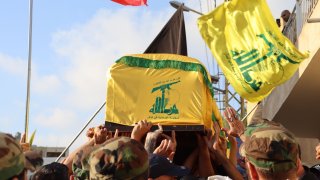Does Iran Still Care About its Proxies?
After striking against Israel on Tuesday, Iran probably recognized the risks involved but nonetheless concluded that inaction would impose reputational costs at a time when Hezbollah was suffering a series of humiliations.
Iran’s Islamic Revolutionary Guard Corps (IRGC) launched 180 missiles in “Operation True Promise II” in retaliation for recent Israeli attacks that killed the leaders of the Hezbollah and Hamas militant groups, as well as a senior IRGC commander. Iran claims to have carried out the operation in line with the “legitimate right of self-defense under the United Nations Charter.”
Launching a direct attack against Israel for assassinations carried out against leaders of Iran-linked militia is an admission of the obvious. Iran wants its “axis of resistance” to hold. A pillar of its forward defense strategy in the Middle East, the network of proxy groups provides strategic depth and access to sanctions-busting trade routes across Iraq, Lebanon, and Syria. The Iranian claim to the right of “self-defense” shows that the IRGC and Supreme Leader Khamenei consider its regional arc of armed non-state actors as part of their core security interests. The intention of the strike was likely to reassure a battered Hezbollah of Tehran’s support. Nonetheless, Hezbollah’s status in Tehran’s eyes has diminished from core asset to liability. Moreover, Iran’s missile strikes have made it more vulnerable to Israeli counterattacks, which are likely to be more substantial in scale and impact than the April exchange.
To maximize the perception of success to its rattled domestic audience and regional allies, Iran quickly mobilized a disinformation campaign through state channels and social media to exaggerate the scale of destruction achieved within Israel. The IRGC claimed that 90 percent of the missiles launched successfully hit their targets. While some missiles landed on Israeli territory (with one reported to have landed near an intelligence base outside Tel Aviv), Israeli and U.S. assessments concluded that the strikes resulted in no significant casualties and that military targets were not critically impacted. These facts will not be lost on large swathes of the Iranian public.
Iran’s strikes against Israeli territory elevate their pattern of adversarial confrontation to the level of state-to-state. However, geographical distance makes Iran dependent on proxy warfare against Israel, and Israel is obligated to sustain its military operations to dismantle these networks.
Israel’s Next Target: Iran’s Oil Infrastructure?
Last Wednesday, President Biden called for Israel to conduct a “proportional response.” The principle of proportionality in warfare and international law is invoked to condemn civilian deaths in the conduct of combat operations. However, what proportionality means in real-world terms poses challenges. Israeli officials have been irrevocably clear that as a sovereign state, Israel has the inherent right to retaliate against Iran’s act of aggression.
On September 29, in an English video statement with Persian subtitles, Israeli Prime Minister Netanyahu appealed directly to Iranians: “The vast majority of Iranians know their regime doesn’t care a whit about them. If it did care, if it cared about you, it would stop wasting billions of dollars on futile wars across the Middle East.”
Israel may be signaling that it will not target civilian sites in its response and that it is drawing a distinction between the Iranian people and the regime. But for many Iranians who have watched the Israeli military campaign in Gaza over the last year, fear of an Israeli strike is still palpable.
Israel’s September 30 attack on the Houthi-controlled seaports of Hodeidah and Ras Isa in Yemen may offer clues to Israel’s options in confronting Iran. Israel targeted major ports and power stations operated by the Houthis to disrupt the oil import routes used by the group to fund its military campaigns, including against Western maritime interests in the Red Sea.
Anticipating this move, IRGC-affiliated Iranian media and Telegram channels warned the United States against targeting its refineries, with the implication that Iran would target refineries and oil fields across the Gulf.
If Israel’s retaliation involves targeting Iran’s oil infrastructure, this will put pressure on oil markets, where uncertainty in the aftermath of Iran’s missile strikes saw Brent crude oil futures, the global benchmark, reach $74.45 per barrel on Tuesday. Direct retaliatory strikes on Iranian oil facilities by Israel, as well as the reinstatement of U.S. sanctions on Iranian oil exports, could push prices higher. This could pose problems for the United States ahead of next month’s presidential election. While the price of oil has not been severely affected by a year of escalating conflict in the Middle East, escalation hitting Iranian exports—which supply about 3 percent of world output—would introduce significant new risks. One unknown is whether Saudi Arabia would step up its own production in the event that Israel hit Iran’s facilities.
Is Iran’s Nuclear Infrastructure Next?
A much larger and high-risk Israeli retaliation would target Iran’s nuclear facilities, which have long been in Israel’s sights. After striking against Israel on Tuesday, Iran probably recognized the risks involved, but nonetheless concluded that inaction would impose reputational costs at a time when Hezbollah was suffering a series of humiliations.
On April 19, Israel destroyed part of an S-300 long-range air defense system in Isfahan near a nuclear facility. The calibrated attack conveyed the implicit threat that Israel can target Iran’s nuclear infrastructure. Targeting nuclear sites directly would mean Israel plays its most coveted card, and it may be that it holds back from this course of maximalist action until it makes more operational gains on the ground against Hezbollah in southern Lebanon. Even if Israel targets core nuclear sites, it is unclear whether air strikes alone could destroy or even significantly delay Iran’s nuclear program. This throws open the question: will the escalation be worth the cost, and will it have created the deterrence effect that Israel seeks?
Burcu Ozcelik is a Senior Research Fellow in Middle East Security at the Royal United Services Institute in London.
Image: Mohammad Kassir / Shutterstock.com.

